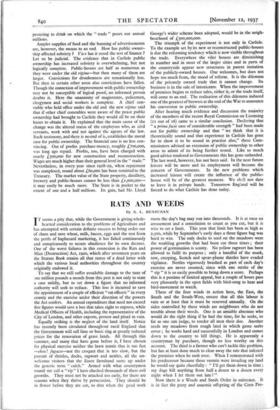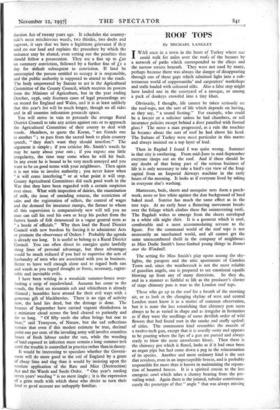RATS AND WEEDS
By S. L. BENSUSAN
T T seems a pity that, while the Government is giving whole- hearted hearted consideration to the problems of Agriculture and has attempted with certain definite success to bring order out of chaos and save wheat, milk, bacon, eggs and the rest from the perils of haphazard marketing, it has failed continuously and conspicuously to secure obedience for its own decrees. One of the worst failures in this connexion is the Rats and Mice (Destruction) Act, z92o, which after seventeen years on the Statute Book retains all that status of a dead letter with which the various local authorities throughout the country originally endowed it.
To say that we still suffer avoidable damage to the tune of ane million pounds a month from this pest is not only to state a case mildly, but to set down a figure that no informed authority will seek to reduce. This loss is incurred to save the appointment of a couple of efficient " rat officers " in every county and the exercise under their direction of the powers the Act confers. An annual expenditure that need not exceed five figures would save a loss that takes eight to express, while Medical Officers of Health, including the representative of the City of London, and other experts, protest and plead in vain.
Equally striking is the neglect of the land itself. Notice has recently been circulated throughout rural England that the Government will sell lime or basic slag at greatly reduced prices for the renovation of grass lands. All through this summer, and many that have gone before it, I have chosen for physical exercise neither the lawn tennk that is too fast —eheu I fugaces—nor the croquet that is too slow, but the pursuit of thistles, docks, ragwort and nettles, all the un- welcome visitors that the Essex farmhand sums up under the generic term " culch." Armed with what countrymen round me call a " rip " I have checked thousands of these evil growths. They must not be attacked too early, for there are seasons when they thrive by persecution. They should be in flower before they are cut, so that when the good work • starts the day's bag may run into thousands. It is at once an amusement and a consolation to count as you cut, but it is wise to set a limit. This year that limit has been as high as 2,50o, while by September's early days a three figure bag was hard to win. The only docks to seed on the meadows were the weakling growths that had been cut three times ; their power of germination is scanty. No yellow ragwort has been allowed to fulfil its purpose ; only a handful of the musk, sow, creeping, Scotch and spear-plume thistles have evaded vigilance. Nettles vigorously brushed as part of each day's exercise are never counted, since with one stroke of the " rip " it is so easily possible to bring down a score. Perhaps this is a pastime of limited appeal, but a couple of hours pass very pleasantly in the open fields with bird-song to hear and bird-movement to watch.
Three of the four winds in action here, the East, the South and the South-West, ensure that all this labour is vain or at least that it must be renewed annually On the sides controlled by these winds are neighbours who do not trouble about their weeds. One is an amiable absentee who would do the right thing if he had the time, for he seeks, so far as one can judge, to render all men their due. Another seeds my meadows from rough land in which game seeks cover ; he works hard and successfully in London and comes down to the country to kill things. He is apparently a countryman by purchase, though no less worthy on this account. The third is a farmer who can't tackle this problem, but has at least done much to clear away the rats that infested the premises when he took over When I remonstrated with his predecessor because these vermin were invading my land he would say quite cheerfully : " I'll get them down in time ; my dogs kill anything from half a dozen to a dozen every night when I let them out late.! "
Now there is a Weeds and Seeds Order in existence. It is in fact the puny and anaemic offspring. of the Corn Pro- duction Act of twenty years ago. It schedules the country- side's most mischievous weeds, two thistles, two docks and ragwort, it says that we have a legitimate grievance if they seed ,on our land and explains the procedure by which the nuisance may be abated, even setting out the penalties that should follow a prosecution. They are a fine up to £zo on summary conviction, followed by a further fine of kr a day for default subsequent to conviction. If land be unoccupied the person entitled to occupy it is responsible, and the public authority is supposed to attend to the roads. The body empowered by Statute to act is the Agricultural Committee of the County Council, which receives its powers from the Minister of Agriculture, but in the year ending October, 1936, only fourteen cases of legal proceedings are on record for England and Wales, and it is at least unlikely that this year's list will be much longer, though on all sides and in all counties infestation proceeds apace.
You will strive in vain to persuade the average Rural District Council to take any action against rats or to approach the Agricultural Committee of their county to deal with weeds. Members, to quote the Koran, " are friends one to another " ; to pass from the sacred book to plain country speech, " they don't want they should interfere." The argument is simple ; if you criticise Mr. Smith's weeds he may be nasty about your rats ; if you expose one little Irregularity, the time may come when he will hit back. In any event he is bound to be very much annoyed and you want to be on good terms with your neighbours. Then again it is not wise to involve authority ; you never know when " it will come interfering " or at what point it will stop. County Agricultural Committees did such good work in the War that they have been regarded with a certain suspicion ever since. What with inspection of dairies, the examination of milk, the issue of unending returns, the restriction of sales and the registration of sellers, the control of wages and the demand for insurance stamps, the farmer to whom all this supervision is comparatively new will tell you no man can call his soul his own or keep his pocket from the furtive hands of folk denounced in a vague general term as a horde of officials." Why then load the Rural District Council with new burdens by forcing it to administer Acts or promote the observance of Orders ? Probably the agenda is already too long. It is useful to belong to a Rural District Council. You can often direct its energies quite lawfully along lines of personal advantage, but these advantages would be much reduced if you had to supervise the acts of husbandry of men who are associated with you in business. Better to leave well enough alone and to regard both rats and weeds as you regard drought or frosts, necessary, regret- table and inevitable evils.
I have been writing in a woodside summer-house over- looking a strip of meadowland. Autumn has come to the woods, the fruit on mountain ash and whitethorn is already thinned ; brambles have atoned for their evil ways with a generous gift of blackberries. There is no sign of activity now, the land lies dead, but the damage is done. The breezes of September have carried vagrant thistledown in a miniature cloud across the land cleared so patiently and for so long. " Of fifty seeds she often brings but one to bear," said Tennyson, of Nature, but the sad reflections remain that even if this modest estimate be true, decimal point one per cent. of the invading army will involve countless hours of fresh labour under the sun, while the weeding of land exposed to infection must remain a long summer task until the trouble is controlled in practice rather than in theory.
It would be interesting to speculate whether the Govern- ment will do more good to the soil of England by a grant of cheap lime and slag than it would by insisting upon the resolute application of the Rats and Mice (Destruction) Act and the Weeds and Seeds Order. " One year's seeding seven years' weeding " is no mere jingle ; it is the expression of a grim truth with which those who desire to turn their land to goad account are unhappily familiar,















































 Previous page
Previous page